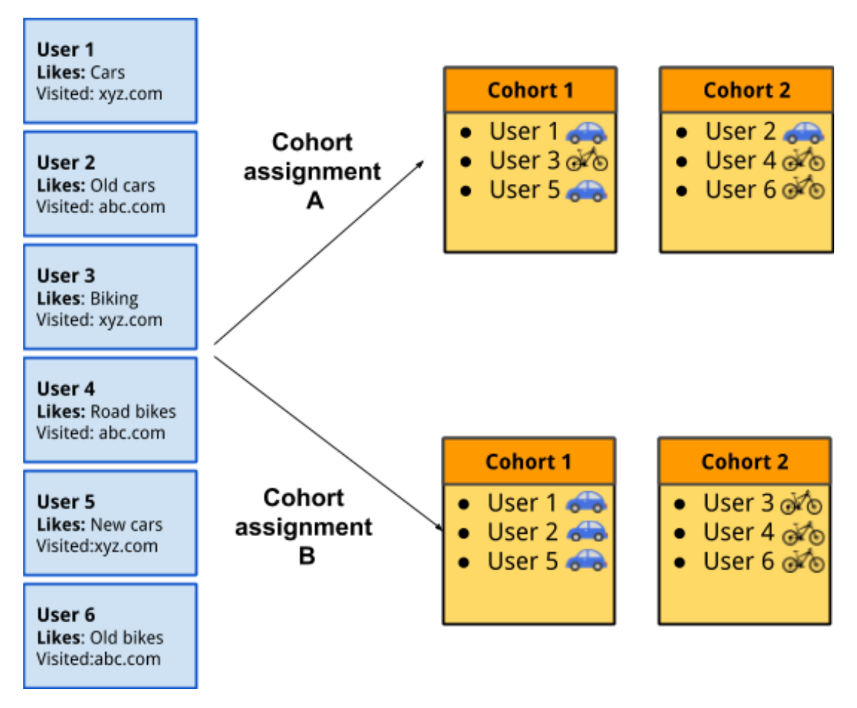Google today announced that it is rolling out Federated Learning of Cohorts (FLoC), a crucial part of its Privacy Sandbox project for Chrome, as a developer origin trial.
FLoC is meant to be an alternative to the kind of cookies that advertising technology companies use today to track you across the web. Instead of a personally identifiable cookie, FLoC runs locally and analyzes your browsing behavior to group you into a cohort of like-minded people with similar interests (and doesn’t share your browsing history with Google). That cohort is specific enough to allow advertisers to do their thing and show you relevant ads, but without being so specific as to allow marketers to identify you personally.
This “interest-based advertising,” as Google likes to call it, allows you to hide within the crowd of users with similar interests. All the browser displays is a cohort ID and all your browsing history and other data stay locally.

The trial will start in the U.S., Australia, Brazil, Canada, India, Indonesia, Japan, Mexico, New Zealand and the Philippines. Over time, Google plans to scale it globally. As we learned earlier this month, Google is not running any tests in Europe because of concerns around GDPR and other privacy regulations (in part, because it’s unclear whether FLoC IDs should be considered personal data under these regulations).
Users will be able to opt out from this origin trial, just like they will be able to do so with all other Privacy Sandbox trials.
Unsurprisingly, given how FLoC upends many of the existing online advertising systems in place, not everybody loves this idea. Advertisers obviously love the idea of being able to target individual users, though Google’s preliminary data shows that using these cohorts leads to similar results for them and that advertisers can expect to see “at least 95% of the conversions per dollar spent when compared to cookie-based advertising.”
Google notes that its own advertising products will get the same access to FLoC IDs as its competitors in the ads ecosystem.
3 adtech and martech VCs see major opportunities in privacy and compliance
But it’s not just the advertising industry that is eyeing this project skeptically. Privacy advocates aren’t fully sold on the idea either. The EFF, for example, argues that FLoC will make it easier for marketing companies that want to fingerprint users based on the various FLoC IDs they expose, for example. That’s something Google is addressing with its Privacy Budget proposal, but how well that will work remains to be seen.
Meanwhile, users would probably prefer to just browse the web without seeing ads (no matter what the advertising industry may want us to believe) and without having to worry about their privacy. But online publishers continue to rely on advertising income to fund their sites.
With all of these divergent interests, it was always clear that Google’s initiatives weren’t going to please everyone. That friction was always built into the process. And while other browser vendors can outright block ads and third-party cookies, Google’s role in the advertising ecosystem makes this a bit more complicated.
“When other browsers started blocking third-party cookies by default, we were excited about the direction, but worried about the immediate impact,” Marshall Vale, Google’s product manager for Privacy Sandbox, writes in today’s announcement. “Excited because we absolutely need a more private web, and we know third-party cookies aren’t the long-term answer. Worried because today many publishers rely on cookie-based advertising to support their content efforts, and we had seen that cookie blocking was already spawning privacy-invasive workarounds (such as fingerprinting) that were even worse for user privacy. Overall, we felt that blocking third-party cookies outright without viable alternatives for the ecosystem was irresponsible, and even harmful, to the free and open web we all enjoy.”
It’s worth noting that FLoC, as well as Google’s other privacy sandbox initiatives, are still under development. The company says the idea here is to learn from these initial trials and evolve the project accordingly.































Comment